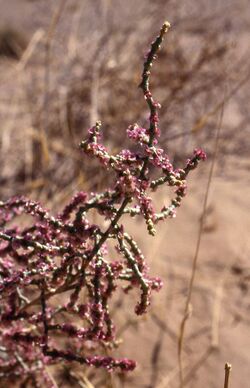Biology:Hammada (plant)
| Hammada | |
|---|---|

| |
| Haloxylon griffithii | |
| Scientific classification | |
| Kingdom: | Plantae |
| Clade: | Tracheophytes |
| Clade: | Angiosperms |
| Clade: | Eudicots |
| Order: | Caryophyllales |
| Family: | Amaranthaceae |
| Subfamily: | Salsoloideae |
| Genus: | Hammada Iljin |
Hammada is a genus of flowering plants belonging to the family Amaranthaceae.[1] It is also in the Salsoloideae subfamily.[2] Although it is a very unclear and unsorted genus with many species that have later been classed as synonyms.
Its native range is Central Asia and is found in Iraq, Lebanon, Palestine, Syria, Turkey and Uzbekistan.[1] They are often found growing in alkaline or saline habitats.[3]
Description
They are perennial plants, with a glabrous (smooth) wood (only at the base). They can grow up to 40–60 cm (16–24 in) tall.[4] The weed-like plants have regular, minute, or small, cyclic flowers. The flowers have no petals, but 5 sepals which are united at the base. It has 5 stamens and the ovary is positioned superior and consists of 2 united carpels. Which late matures into a fruit (or seed capsule).[3]
Known species
According to Plants of the World Online;[1]
- Hammada eriantha Botsch.[5] (from Uzbekistan)
- Hammada ramosissima (Boiss. ex Eig) Iljin (from Iraq, Lebanon, Palestine, Syria and Turkey)
Although, Schüssler in 2017, listed the following species; Hammada eriantha Botsch., Hammada griffithii (Moq.) Iljin, Hammada negevensis Iljin & Zoh., Hammada salicornica (Moq.) Iljin, Hammada schmittiana (Pomel) Botsch. and Hammada thomsonii (Bunge) Iljin.[2]
It is not known what the genus name of Hammada is in reference to, but Hamada in Arabic is a desert landscape.
It was first described and published in Bot. Zhurn. (Moscow & Leningrad) Vol.33 on page 582 in 1948.[1]
The genus is not recognized by the United States Department of Agriculture and the Agricultural Research Service, as they list it as a synonym of Haloxylon Bunge.[6]
Note; Hammada scoparia (Pomel) Iljin a former species in the genus, is classed as an accepted synonym of Haloxylon scoparium Pomel.[7]
References
- ↑ 1.0 1.1 1.2 1.3 "Hammada Iljin | Plants of the World Online | Kew Science" (in en). https://powo.science.kew.org/taxon/urn:lsid:ipni.org:names:6887-1.
- ↑ 2.0 2.1 Schüssler, Christina; Freitag, Helmut; Koteyeva, Nuria; Schmidt, Denise; Edwards, Gerald; Voznesenskaya, Elena; Kadereit, Gudrun (1 January 2017). "Molecular phylogeny and forms of photosynthesis in tribe Salsoleae (Chenopodiaceae)". Journal of Experimental Botany 68 (2): 207–223. doi:10.1093/jxb/erw432. PMID 28003310.
- ↑ 3.0 3.1 "Flora of Israel | Chenopodiaceae | plant family". https://www-flowersinisrael-com.translate.goog/FamChenopodiaceae.htm?_x_tr_sch=http&_x_tr_sl=iw&_x_tr_tl=en&_x_tr_hl=en-GB&_x_tr_pto=sc.
- ↑ Michael Zohary Flora Palaestina, Volume 1 (1966), p. 166, at Google Books
- ↑ S. K. Czerepanov, Sergeĭ Kirillovich Cherepanov Vascular Plants of Russia and Adjacent States (the Former USSR) (1995), p. 185, at Google Books
- ↑ "Genus Hammada Iljin". https://npgsweb.ars-grin.gov/gringlobal/taxon/taxonomygenus?id=5352.
- ↑ "Hammada scoparia (Pomel) Iljin | Plants of the World Online | Kew Science" (in en). https://powo.science.kew.org/taxon/urn:lsid:ipni.org:names:165876-1.
Wikidata ☰ Q3325413 entry
 |

